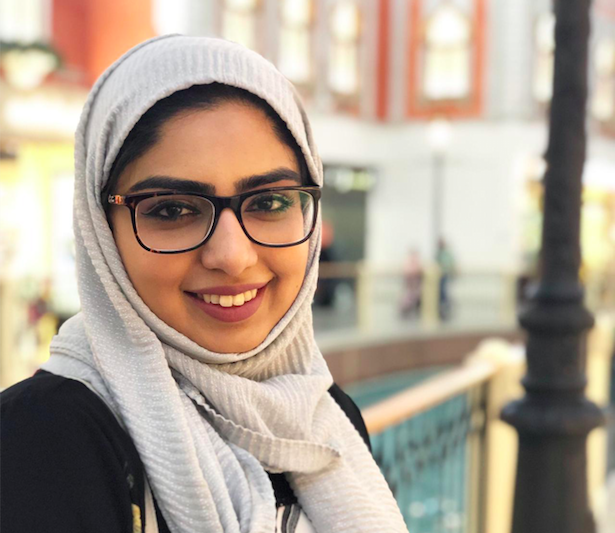Aggies BTHO COVID-19: Leila Khalid Warraich ‘16
As a mental health worker, Leila Khalid Warraich ‘16 is an invisible first responder in the COVID-19 crisis. Her work is now more important than ever.

By Rachel Knight ‘18
Texas A&M University has withstood the test of time because of Aggies who are willing to serve through challenging eras. Though the coronavirus pandemic is perhaps the greatest challenge of our time, Aggies around the world are stepping up to serve and lead by example.
Leila Khalid Warraich ‘16, a College of Liberal Arts former student, is doing her part to BTHO COVID-19 by serving as the doctoral co-director of The New Horizons Family Counseling Center at the College of William & Mary. Warraich and the team she leads partner with local school districts to provide free family counseling services to low income families near the Hampton Roads area in Virginia.
This interview, which was conducted during Ramadan and has been edited and condensed for clarity, provides insight into how Warraich is fighting to BTHO COVID-19.
What does your daily routine look like during the COVID-19 pandemic?
After graduating from Texas A&M in 2016, I attended Johns Hopkins University where I graduated with my master’s degree in counseling in 2018. I am now finishing my second year at the College of William & Mary where I am getting my Ph.D. and am expected to graduate in May 2021. I am currently studying counselor education and supervision.
As a graduate student, I am working remotely from home. I wake up, prepare for the day, and then join my classes remotely. I am also a mental health counselor for families and conduct sessions online; then I work on my thesis and research, and end the day with some exercise.
What are you doing to BTHO COVID-19?
I help with the day-to-day operations of running the counseling center. I also see families as a family counselor and additionally help facilitate groups for parents.
Since COVID-19, we have moved all our counseling services online in the telehealth format to continue to care for our clients. Additionally, this summer we provided online groups for parents on strategies for working with their children during the pandemic.
As a mental health worker in the pandemic, the services my team and I provide have become even more important. Mental health workers face the same worries, fears, and uncertainties as others in healthcare. Not only is our clinic serving families who are home together, but we are helping parents, many of whom are essential workers. We look to provide support to them during this difficult time.
I have been instrumental in helping transition to the online format to ensure families don’t miss any time between services. We still work to ensure privacy and confidentiality in sessions while also providing more accessibility to our patients. Families need services now and will continue to need services as our lives are being changed due to the pandemic. We are committed to helping them during this time. BTHO COVID-19!
How are you coping with self isolation requirements?
I’m baking much more than I normally do—banana bread, brownies, etc. I also got the most recent “Just Dance” on my Xbox and am enjoying competing with my roommate daily to keep active. I stay connected with my family as we are all fasting for Ramadan. We often share our dinners with each other. I also stay connected with my classmates with Zoom game nights (trivia, murder mystery parties, and happy hours)!
What tips or advice do you have for others who are coping with the pandemic?
Though we are isolated from others during this time, it’s important to stay connected. It can be a lot to look at screens all day, but I recommend taking a walk outdoors with your family or hopping on a Zoom call with friends just to catch up. It’s equally important to get time away from screens as well.
Have compassion for yourself during this tough time. It’s okay if you don’t bake fancy bread or finish a puzzle. Self-care and self-love is incredibly important for both yourself and for other family members. Make sure you have downtime to reset in addition to staying connected with family and friends!
Have you used your liberal arts education during the pandemic? If so how?
My time at A&M and especially studying sociology really prepared me to think about society and communities on a systemic level. We see the pandemic is changing how we operate not just on a daily level, but also what changes lie ahead.
Our way of life, our education, and our jobs are going to be changed due to COVID-19. As a counselor who does most of her work face-to-face, I can see that the pandemic is already changing what the future of counseling and higher education will look like. It’s very interesting to be a part of it. My liberal arts education prepared me to think in a systematic manner and consider these larger implications.
Share your COVID-19 Story!
We want to hear how the COVID-19 pandemic has impacted your life. Share your story with the College of Liberal Arts by filling out this survey.
